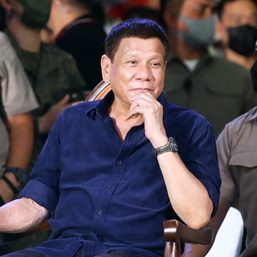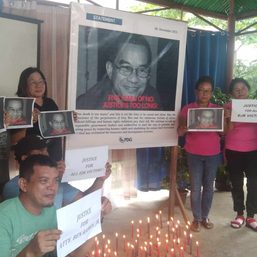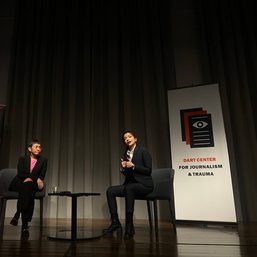SUMMARY
This is AI generated summarization, which may have errors. For context, always refer to the full article.
PARIS, France – France’s presidential election headed into its final week Sunday, April 29, with the spluttering economy topping the agenda and Nicolas Sarkozy and his rival battling to woo millions of far-right voters.
Socialist Francois Hollande is tipped to win the run-off next Sunday as voters punish the right-wing incumbent for his failure to slash stubbornly high unemployment in the eurozone’s second biggest economy.
Opinion polls say Hollande is on course to become the first Socialist president of France since Francois Mitterrand was re-elected in 1988.
The two 57-year-old candidates plan a grueling final week of campaigning, with a series of rallies across the country and the highlight coming on Wednesday at a televised duel expected to draw millions of viewers.
Unemployment, pensions and pay have been topping the list of issues that voters are most concerned about in France, a major player on the world stage and a country at the political heart of Europe.
The thrice-married Sarkozy portrayed himself as a modernizer and vowed a clean break with France’s ruling elite when he campaigned for the presidency in 2007, but has been criticized for reneging on many of his promises.
This time around he says he will tackle France’s giant budget deficit and tax many citizens abroad, while Hollande vows to raise taxes on big firms and people earning more than one million euros a year.
Hollande, who ran the Socialist party for a decade but has never held a ministerial post, also promises to increase the minimum wage, hire 60,000 new teachers and bring the retirement age back to 60 from 62 for some workers.
He was quick to seize on new official data released Friday that showed joblessness rose again last month by 16,600 to reach 2.88 million, at 9.3% its highest level since 1999.
Sarkozy, the son of a Hungarian immigrant who vowed in his 2007 campaign to cut unemployment to 5%, has blamed the bleak figures on the sovereign debt crisis that has swept across Europe.
He points to reforms that he managed to push past a dubious parliament and public — the unpopular increase in the retirement age and a measure to ensure the independence of universities.
Sarkozy also proudly claims he has saved France from the fate of Italy and Spain, where efforts to solve the crippling debt crisis have led to harsh austerity measures.
Sarkozy was briefly the most popular French president since General Charles de Gaulle.
Five years on, after promises of wealth and job creation proved a mirage, he is seeking re-election with the worst opinion poll approval ratings in modern French history.
How to deal with the debt crisis is a major issue in the election campaign.
Hollande gained strength and credibility last week as the key plank in his economic strategy gathered increasing support in Europe.
His call for the European Union’s fiscal pact to be renegotiated to include ways to boost growth had been derided by Sarkozy as naive and dangerous, and a breach of France’s word to its partners.
But on Wednesday, European Central Bank governor Mario Draghi called for growth initiatives and Germany’s Angela Merkel conceded that new measures were needed, although neither shifted in their support for the pact.
The presidential election was shaken up by the 18% result of anti-immigration, anti-EU populist Marine Le Pen in last Sunday’s first round.
That was not enough to stay in the race for a 5-year term in the Elysee Palace but was the highest-ever for her far-right National Front party.
Sarkozy, the first sitting French president to lose a first-round vote, has tilted ever further to the right since then, vowing to “defend the French way of life,” drastically reduce immigration and secure France’s borders.
Both he and Hollande are battling to woo the 6.4 million who plumped for Le Pen and who are seen as key to winning the second round, which opinion polls predict Hollande will take with 55% to Sarkozy’s 45%.
Sarkozy has ruled out any pact with the National Front, saying he would give the party no ministerial posts if re-elected, but Hollande still accuses his rival of going too far to woo the extreme right.
Le Pen did well in the first round among white working-class voters who might once have backed the left, and the Socialist candidate has himself made concession to their concerns.
He said immigration needs to be better regulated and that he will keep a law that Sarkozy passed that bans the full-face veil worn by some Muslim women.
Le Pen is not expected to endorse either candidate before May 6, and is thought to relish the prospect that a defeat for Sarkozy would leave the centre-right in disarray before legislative elections in June.
The election battle took an intriguing turn this weekend when disgraced ex-IMF boss Dominique Strauss-Kahn, a French Socialist, made a dramatic incursion into the campaign with a claim Sarkozy orchestrated his downfall.
The ex-International Monetary Fund boss had been favored to win the vote until May last year, when he was arrested in New York and accused of sexually assaulting a hotel maid. The charges were later dropped.
Strauss-Kahn told Britain’s Guardian newspaper that his spectacular fall from grace was orchestrated by opponents to prevent him from standing as the Socialist candidate in the election. – Agence France-Presse
Add a comment
How does this make you feel?
![[EDITORIAL] Sorry Arnie Teves, walang golf sa kulungan](https://www.rappler.com/tachyon/2024/03/animated-arnie-teves-arrest-carousel.jpg?resize=257%2C257&crop=310px%2C0px%2C720px%2C720px)




There are no comments yet. Add your comment to start the conversation.